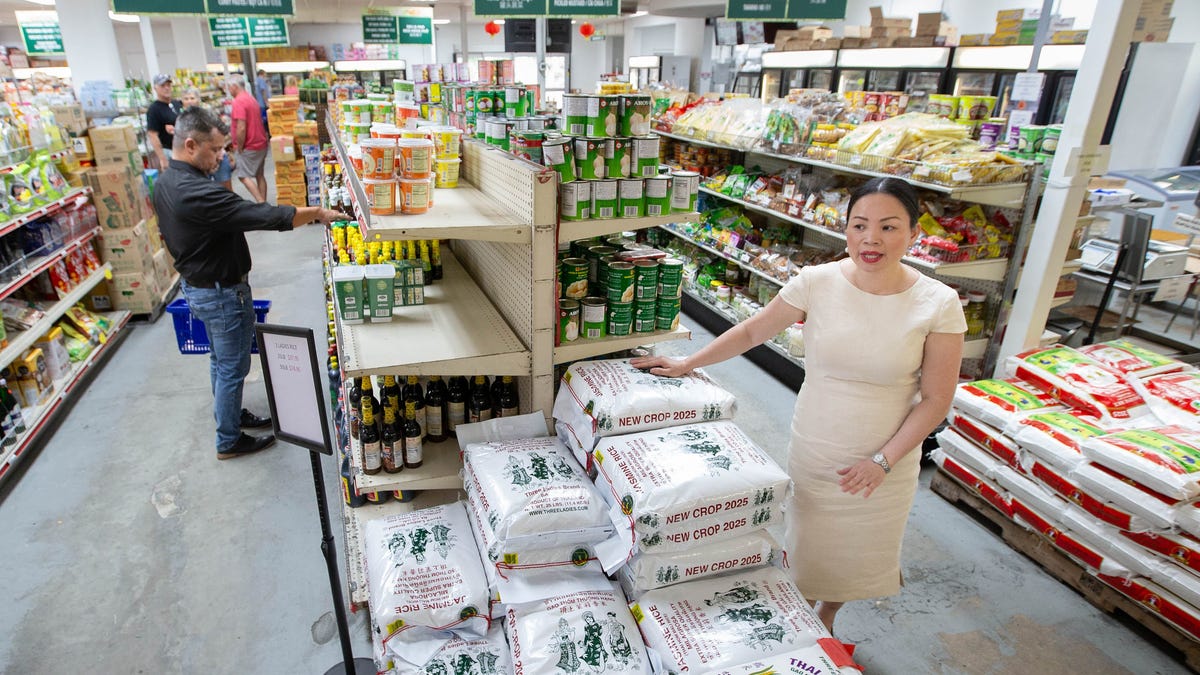The U.S. Court of International Trade is the first to consider whether to block or uphold Trump’s tariffs, a key to his foreign policy and domestic spending goals.
Trump suggests lowering tariffs on China to 80% ahead of trade talks
In a social media post, President Donald Trump suggested lowering tariffs on China from 145% to 80% ahead of trade negotiations.
- Five businesses contend Trump has no authority to impose tariffs in what lawyers a ‘breathtaking power grab’
- Justice Department lawyers say presidents have been regulating trade ‘since the Nation’s infancy,’ and have been upheld by Congress and the courts.
Five small businesses called President Donald Trump’s tariffs an illegal power grab and urged a federal trade court to block them, but government lawyers contend presidents have been imposing tariffs since the country’s infancy.
The U.S. Court of International Trade already rejected a request from the businesses on April 22 to block the tariffs temporarily while the case is litigated. Judges Gary Katzmann, Timothy Reif and Jane Restani heard arguments May 13 in New York about whether to decide the case quickly, without gathering more evidence.
Trump imposed 10% tariffs on imports from around the world on April 2, with higher rates on countries that sell more to the U.S. than they import, such as China. Trump has argued the tariffs will generate billions of dollars in revenue while also encouraging companies to increase manufacturing in the U.S.
Businesses call tariffs ‘unlawful’ while government contends courts have upheld them
The companies represented by the Liberty Justice Center, a nonprofit public-interest litigation firm, contend Trump has no authority to impose unlimited, unreviewable tariffs in any amount on any country at any time.
“The president’s imposition of so-called ‘Liberation Day’ tariffs represents an unprecedented and unlawful expansion of executive authority,” said Jeffrey Schwab, a lawyer representing the businesses. “This is not what Congress intended.”
Eric Hamilton, a Justice Department lawyer, said the Supreme Court upheld the president’s tariff authority in a 1974 case. Hamilton said the courts have never reviewed political decisions such as declarations of national emergencies such as the one Trump declared under the International Emergency Economic Powers Act. And the Senate refused to block Trump’s tariffs in an April vote.
“These are questions decided by the political branches in the end,” Hamilton said of tariff decisions made by Congress or the president.
Judge questions how to gauge whether Trump’s tariffs are justified
Judge Jane Restani asked how the court could gauge whether the tariffs are responding to an “unusual” or “extraordinary” situation.
“How would the court draw that line?” Restani asked. “’You know it when you see it’ doesn’t work. Give me some words.”
Schwab said Trump’s invocation was far outside an emergency because the country ran trade deficits for decades.
“I’m asking this court to be an umpire and to call a strike,” Schwab said. “You’re asking me, ‘Where’s the strike zone? Is it at the knees or slightly below the knees?’ I’m saying it’s a wild pitch and it’s on the other side of the batter and it hit the backstop so we don’t need to debate the difference.”
Lawyers dispute what ‘regulate’ means in terms of tariffs
Justice Department lawyers said Congress empowered presidents to conduct foreign affairs and regulate trade, including with tariffs since 1794. But Schwab argued regulating trade means inspections rather than taxing imports.
Judge Gary Katsmann noted that the U.S. Supreme Court upheld identical language in a 1974 ruling that allowed former President Richard Nixon’s surcharges on imports when the country went off the gold standard.
“Why do you suggest we come to an opposite conclusion when the statutory language is identical?” Katsmann asked.
Schwab said the court needed to take a fresh look because the law Trump cited to “regulate” international trade was approved later.
“The term regulate does not mean the power to tax or tariff,” Schwab said.
Judge Timothy Reif said regulation could mean tariffs.
“’Regulate’ could mean a lot of different things, so could it mean tariffs,” Reif said.
Who is fighting Trump’s tariffs?
The businesses that filed the lawsuit are:
- VOS Selections, which imports and distributes small-production wines, spirits and sakes from six continents.
- Plastic Services and Products, which does business as Genova Pipe, is based in Utah and manufactures equipment with plastics and steel from Asia, Europe and the Middle East.
- MicroKits LLC is based in Virginia and makes educational electronic kits and musical instruments with parts from China, Mexico, Thailand and Taiwan.
- FishUSA is based in Pennsylvania and sells fishing tackle and related gear from Canada, China, South Korea and Kenya.
- Terry Precision Cycling is based in Vermont and imports women’s cycling apparel from China, Taiwan, Vietnam, Italy and the Philippines.
